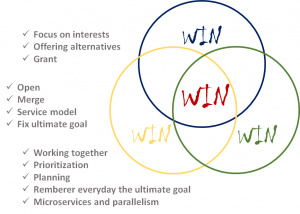Regular readers will be aware that in my last post, I made the case for a win-win approach for mature organisations to successfully deliver digital transformation. I think there are many ways we could explain this. Established organisations infrastructure may be old, or their work processes may be complex and very different from those in modern “agile” companies, or their job rotation arrangements may be less efficient or have considerable social impact.
I am also convinced that every company has its own “soul”, or character: its culture. In some cultures, it may be a real challenge to establish new lines or divisions to move at the “agile” pace of digital channels and create innovative products. Running these alongside more traditional and long-established arrangements is hard, and moving straight to a more agile arrangement is even more challenging. Almost like to ask our parents, used to listen to Pink Floyd and Dire Straits, to appreciate after a few listens the Imagine Dragons or Coldplay; but if they are true music lovers, they will appreciate, in their time, but they will succeed.
Distance between teams
Another element that may cause problems is communication between departments. This is particularly true of the distance between business departments and IT. In more extreme cases, the IT department may even be a separate company, as a result of outsourcing.
For these companies to enter the era of digital transformation, it is important to define exactly what must be put in place, and what must be removed. First of all the company needs to get rid of any suggestion that:
- business and IT structures are not looking for common goals, not focusing on the customer and not looking for a win for all stakeholders;
- there is extremism: companies must avoid IT structures that focus on IT issues or business structures that work only on the business aspects;
- there is no presumption of hierarchy between IT and business departments: they must recognize each other’s expertise;
- the expression digital transformation treated as ‘just another phrase’, along with Big Data, Hadoop, Data Scientist, Industry 4.0, and others;
- departments spend money just to justify the allocation of the same budget next year.
 A new philosophy to win digital transformation
A new philosophy to win digital transformation
To avoid all this, I suggest, means abandoning a philosophy of I win/you lose, and instead, embrace win/win.
Companies struggle because the IT department is in a “nerd” phase working on a new open source software, or the last reorganization damaged communication between divisions. They find it difficult to manage where IT and the business are two separate legal entity and communication is difficult or strategic objectives are in conflict, where the focus is on cutting costs and not on how to invent a new business. My advice to these companies is to follow these basic steps to create a culture that values win-win for all stakeholders.
- Try to find common interests: abandon the focus on your position and articulate your interests to reach an agreement.
- Offer alternatives to find common ground.
- Give concessions when negotiating: set up wins for others that do not damage your position;
- Let your partners talk about their wins.
- Put yourself in other people’s positions and embrace flexible thinking across divisions and organizations.
- Define a service model, in which the actors have a role.
- Always keep your ultimate goal in mind.
Sharing priorities and emergencies
Win-win agreements may start with top managers, but the next test is for everyone to make the
arrangements work on a daily basis. This means working together, preferably in the same place, and sharing priorities and emergencies. It requires shared long- and short-term (agile) planning. And in the longer term it means developing and changing together, with a similar approach to platforms and services, always keeping the ultimate goal in mind.
SAS's founders Jim Goodnight and Sall Joh remind us that analytics makes the unthinkable possible. Whether you need support with software tools and technical and functional skills, to bridge a communication gap between actors, or to define a service model or winning business plan, SAS can help.
If we want to talk about digital transformation, we must ensure that everyone believes in a common goal of evolution and success. This is essential for success, and is a matter of mindset.
What is more, this win-win approach is not just suitable for companies. It may well also be the way forward in international politics, the debate on immigration, the management of family problems or even just running a building.
We are born with five senses, five input channels for our brain. Historically, we have shown that when we make an effort to improve ourselves, we win. If we use our brains and work together, we can all win.
